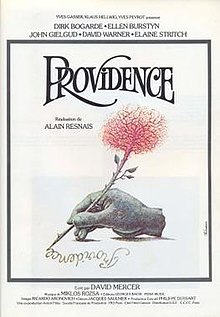Providence (1977 film)
| Providence | |
|---|---|
 |
|
| Directed by | Alain Resnais |
| Written by | David Mercer |
| Starring |
Dirk Bogarde Ellen Burstyn John Gielgud David Warner Elaine Stritch |
| Music by | Miklós Rózsa |
| Cinematography | Ricardo Aronovich |
| Edited by | Albert Jurgenson |
|
Release date
|
|
|
Running time
|
110 minutes |
| Country | France Switzerland |
| Language | English |
Providence is a 1977 French/Swiss film directed by Alain Resnais from a screenplay by David Mercer. It explores the processes of creativity through a portrayal of an ageing novelist, played by John Gielgud, who imagines scenes for his latest novel which draw upon his past history and his relationships with members of his family. The film won the 1978 César Award for Best Film.
On the eve of his 78th birthday, the ailing, alcoholic writer Clive Langham spends a painful and sleepless night mentally composing and recomposing scenes for a novel in which characters based on his own family are shaped by his fantasies and memories, alongside his caustic commentary on their behaviour. His son Claude appears as a cold and unforgiving prosecuting lawyer, who revels in spiteful repartee. His second (illegitimate) son Kevin features as an idealistic soldier accused of the mercy-killing of an old man who was being hunted down. Sonia, the wife of Claude, shows sympathy with Kevin and seems eager to seduce him in protest at her husband's callousness. Clive also invents the character of Helen, as Claude's mistress, but she bears the features of Clive's dead wife Molly who committed suicide. Clive's imagination is also haunted by scenes of an autopsy on the corpse of an old man, a military round-up of elderly people who are detained in a sports stadium, and a dark tangled forest in which a hunted man metamorphoses into a werewolf. Before Clive loses consciousness, it is Kevin whom he sees as the werewolf in the forest; Claude shoots Kevin but seems to identify him with their father.
On the following day, Clive welcomes Claude, Sonia and Kevin (in reality an astrophysicist) for an idyllic birthday lunch in the sunlit garden of his country mansion, and their relationships are characterised by mutual affection and good humour, albeit with signs of self-restraint in deference to the occasion. After lunch, in what he seems to envisage as a final parting, Clive unexpectedly asks them all to leave without a word.
The producer Klaus Hellwig suggested to Resnais that he should make a film with the British playwright David Mercer. The two men met in London and, overcoming the obstacle that neither of them spoke the language of the other fluently, they began a series of discussions of drafts and redraftings which extended over a year. Mercer's original idea concerned the situation of political prisoners held in a sports stadium, symbolising a world in collapse. Gradually the outline shifted to the imagination of an aging writer seeking the material for a novel. Resnais proposed making the whole film into a metaphor of creation and disintegration; he also made extensive alterations to the chronology of the scenes as written by Mercer.
...
Wikipedia
